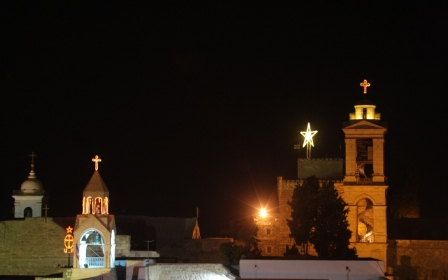Israel's Knesset to vote on controversial coronavirus bill after night of arrests

Protests, arrests and a second wave of Covid-19 have hit Israel this week as the Knesset votes on a controversial coronavirus bill on Wednesday.
If passed, the legislation will grant the Israeli government overarching powers to impose restrictions on the public until June 2021.
The bill, which will be voted on in its second and third readings, will severely limit the Knesset’s checks and balances over Israeli coalition government orders related to lockdowns and public restrictions.
Dozens of activists blocked the Knesset's three entrances on Wednesday morning, to protest against the bill.
Demonstrations have become a regular occurrence in Jerusalem in recent weeks.
Stay informed with MEE's newsletters
Sign up to get the latest alerts, insights and analysis, starting with Turkey Unpacked
On Tuesday night, Israeli police arrested 34 anti-government protestors in Jerusalem in Balfour Road, where the official residence of Prime Minister Benjamin Netanyahu is located, for suspected disorderly conduct.
The demonstrators were made up of two groups, one calling for the resignation of Netanyahu over charges of bribery, fraud and breach of trust, and the other led by restaurateurs who are distributing food and marching against the government's handling of the economic crisis caused by the coronavirus pandemic.
Netanyahu could face a maximum sentence of 10 years in prison if he is found guilty of bribery, and three years in prison for fraud and breach of trust.
Ofer Cassif, from the Joint List party in the Knesset, told protesters that “you are the heroes, you are the light that illuminates the darkness we are in."
"Not everyone has the same political positions, but we are united in one thing: we must all fight together for a democratic Israel."
Immediate effect
The proposed bill allows executive branch decisions to go into immediate effect even before any debate and or a vote in parliament.
The Knesset’s Constitution, Law and Justice Committee reached a compromise on Tuesday night with the government that it will have 24 hours to greenlight or reject Covid-19 regulations before they take effect, instead of approving or retroactively rejecting the measures.
The government had refused a suggestion to extend the period to 72 hours.
Relevant Knesset committees will then have seven days to debate them, with the option of a three-day extension,
If the relevant committee does not approve the government decision within this time frame, it would be voted on by the Knesset.
If either a committee or the Knesset decides not to approve a decision – or if no final decision is made within the aforementioned time frame – the decision will be cancelled.
Middle East Eye delivers independent and unrivalled coverage and analysis of the Middle East, North Africa and beyond. To learn more about republishing this content and the associated fees, please fill out this form. More about MEE can be found here.




